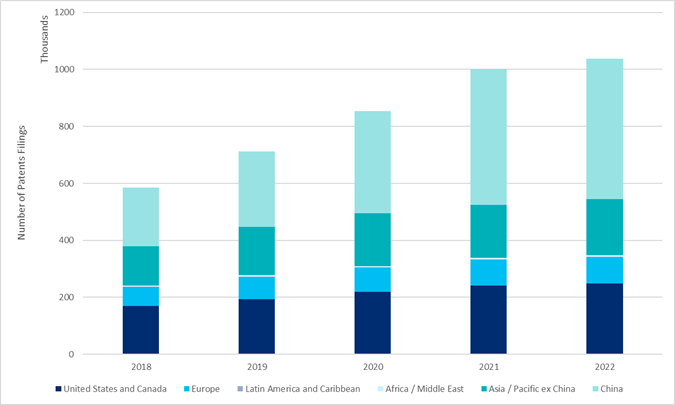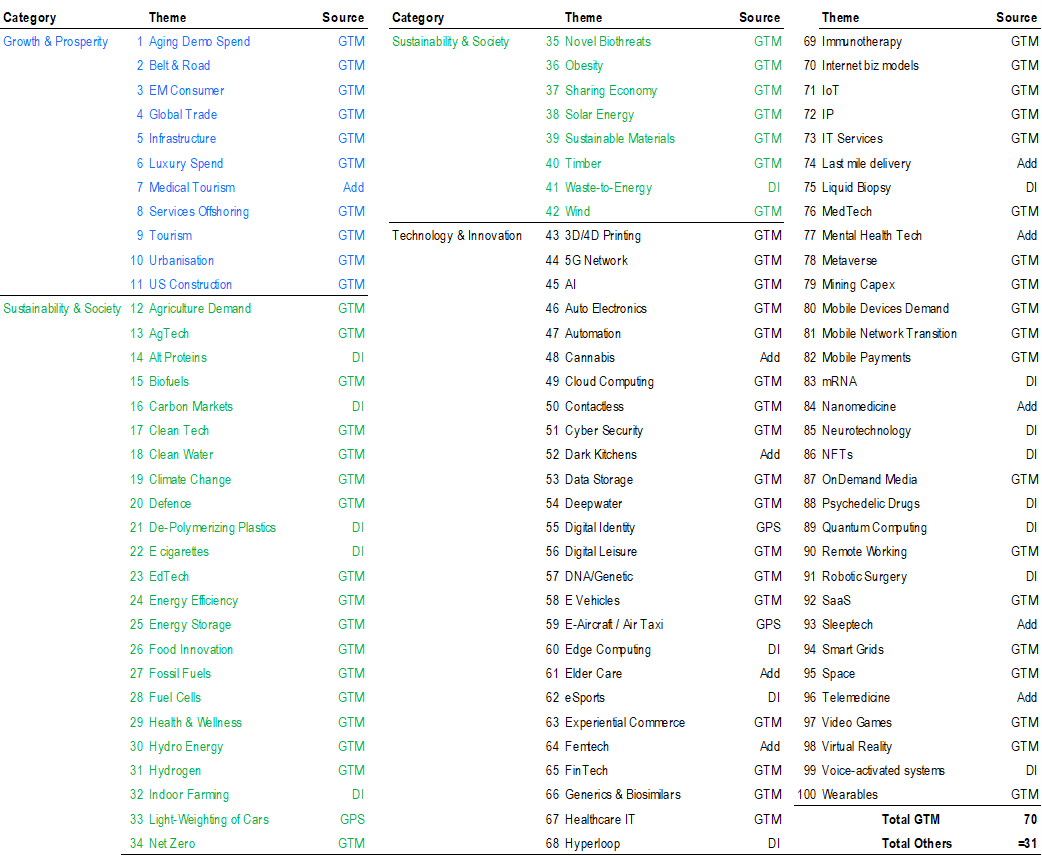
How do you measure innovation? Perhaps the simplest answer to this is: Not easily.
Citi’s Mapping Innovations report seeks to benchmark over 100 areas of innovation.
It does this by viewing them through 3 different lenses:
(1) patent applications, (2) private market investment, and (3) opportunities for growth.
Each of these tells its own story. Taken together, they act as a framework for better understanding innovations as they move from invention to commercialization and beyond.
For patents, for example, the Citi Global Data Insights (CGDI) team, took 33 innovations and leveraged their proprietary data platform called the “Thematic Basket Incubator” to identify trends in the technological patent space.
Patent Filings Over Time for 33 Chosen Technological Innovations

Source: Citi Global Data Insights, Quant-IP
Here are a few quick takeaways:
Patent Applications:
Looking at patent applications offers an understanding into one of the earliest stages of the innovation lifecycle – arguably near the point of invention, and often before they have received any significant investment.
The ease with which a chosen area of innovation can be patented is nuanced. Some are inherently more difficult to patent, and some not patentable at all.
The analysis showed patent filings saw their first decline in over 20 years in 2022, down 6% YoY. Despite this, growth in the 30+ technology-related innovations remained strong, up 4% YoY.
For 30+ chosen technological innovations, China was by far the most active country in the last 5 years, filing more than twice the number of patents as the U.S.. Patents linked to Data Storage, Auto Electronics and Wearables were amongst the most popular globally during this period.
Private Market Investment:
One of the first steps in the process of an innovation moving towards commercialization is to build a company around the innovation in question. Venture Capitalists specialize in funding these inherently high-risk endeavors, often attempting to identify pre-revenue companies that can bring emerging & disruptive innovations to market. But recent market and banking stresses have raised concerns over funding in the VC ecosystem.
Investment into the private markets by VC funds saw a 30% YoY decline in 2022 to $500bn. However, this varied considerably between sectors, ranging from Material & Resources being down only 11% to Financial Services being down 40%.
Investment by VC funds increased 10x from 2010 to 2022, with this period being split into three distinct eras of investment (low growth, moderate growth, and fast growth and decline). The most recent era saw a significant shift to predominantly funding the IT sector.
Opportunities for Growth:
One of the typical characteristics of interest for any area of innovation is the opportunity for growth. The actions of all market participants, including corporates and nation states will at least partly depend on the size of the opportunity.
Th team looks at a variety of third party market forecasts and found that Total Addressable Market (TAM) size estimates of the largest innovations are 30,000x the size of the smallest ones, with forecast growth rates for the period 2021-2026 ranging from 3% to 63%.
There was less correlation than might be expected between the TAM size estimates and forecast growth rates. Rather, the innovation type seems to be the biggest indicator of anticipated future opportunities, with technology-related innovations forecast to grow faster.
100 Different Areas of Innovation

Source Code: GTM = Global Theme Machine, DI = Disruptive Innovations GPS Series reports, GPS = Other GPS Series reports, Add = Additions Chosen by GGI
© 2023 Citigroup Inc. No redistribution without Citigroup’s written permission.
Source: Various 3rd-Party Sources (See Appendix), Citi Global Insights
Mind the gap
The full report goes on to look at some of the issues around bridging the gap from invention to commercialization.
With increasing levels of private investment into emerging and disruptive innovations in recent years, there have been concerns from some quarters about how such technologies are playing an increasingly significant role in our lives.
Some market participants will naturally be motivated by advances in more short-term commercial applications. This makes it even more important that long-term support provided by nation states, particularly for the early development activities that are necessary to keep an industry competitive. While we often think of the technological innovations that we take for granted now as simply being the by-product of competition between technology giants, in many instances, they would not have had the opportunity to flourish without initial government support.
Policy makers are increasingly becoming involved in supporting the early-stage start-ups through various incentive schemes. France is a good example of a country heavily investing in R&D. In the wake of the 2008-09 Global Financial Crisis, digital investment by the French government significantly and dramatically increased – more than doubling between 2007 and 2009. By 2020, France was outpacing nearly all its peers when compared across measures such as Business Enterprise R&D (BERD) intensity as a percentage of GDP and total (direct and tax) government support for business R&D as a percentage of GDP.
For the full report, if you are a Velocity subscriber, please login here
Citi Global Insights (CGI) is Citi’s premier non-independent thought leadership curation. It is not investment research; however, it may contain thematic content previously expressed in an Independent Research report. For the full CGI disclosure, click here.